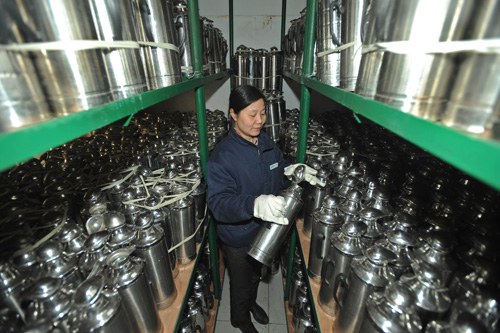|
 |
|
INDISPENSIBLE THERMOS: A staff worker of Chengdu Railway Station checks the thermoses prepared for passengers in Chengdu, Sichuan Province, during the Spring Festival travel rush on January 30, 2013 (XINHUA) |
Of all the multitude of culture shocks Chinese people traveling in the United States experience, many find the difference in drinking habits to be the most onerous. In short, they find it difficult to get their hands on hot water in the United States.
In their home country, Chinese people are used to drinking hot water. The kettle is an indispensable item in all Chinese kitchens and hotels. However, when they are visiting the United States, they can find neither a kettle nor a thermos flask.
It turns out that the American people do not drink hot water. Instead, they drink running water, straight from the tap, or even go so far as to add ice to their water. All of this can prove a little overwhelming for first-time travelers from China.
Shock
"There are no kettles or thermos for sale in most American supermarkets," said Yang Rongrong who studied in the United States for two years to earn an MBA degree. "Luckily, I was in California, where many Chinese people live. I was able to buy a kettle and a thermos from one of the supermarkets run by the Chinese."
Some American families do keep kettles for heating water, but they are only big enough to heat water for a few cups of tea, and this was far from sufficient for drinking purposes, she said.
At the beginning of her spell in the United States, the difference in drinking habits came as a big shock to her.
"The Americans drink beverages with ice even in the winter," said Yang. "Only cold water is provided in restaurants. It was something we had to get used to."
Young and open-minded as she was, she quickly adapted to the drinking habits of the inhabitants of her host country. Yet despite this, she still found it difficult to accept the notion of a drinking fountain.
"People would take some water directly from the drinking fountains in the United States. In China we would never do that. I hate the distinctive smell of running water and find it very off-putting," she said.
After completing her MBA studies, both she and her boyfriend came back to China. A major reason for the couple's return from the United States is the country's living habits.
Compared to Yang, Zhu Zhengfa had a harder time when he was in the United States. The 55-year-old man, along with his wife, flew to the United States to visit their daughter in July of 2013. His daughter works in Boston.
"When I arrived in the United States, I found that in schools, shopping malls, libraries and other public places, no hot water is available. Some people drank the running water directly from the tap," said Zhu. "This is difficult to accept for elderly Chinese people like me. We have been used to drinking hot water our whole lives!"
"My daughter bought a big thermos for us," said Zhu. "When we went out at weekends, we would keep the hot water in the thermos." When it came to longer trips, the couple would bring an electric water heater along with them to address their plight.
Another experience that left a lasting impression was when Zhu's daughter gave birth to a baby. "We went to the hospital. It was a great hospital, with first-class equipment and a fabulous level of care with only one big problem: They didn't provide hot water. New mothers all drank water that hadn't been boiled. This is not acceptable in our culture," said Zhu.
According to the Chinese traditions, after the delivery of a baby, the mother should engage in a period of postpartum confinement. New mothers must spend 30-odd days after childbirth indoors, focusing on warmth and the restoration of energy. They are advised to follow a long list of strict rules, one of which says they should keep warm and never touch cold water. Even the very mention of drinking it would be out of the question.
Finally, the old couple resorted to boiling water at home and taking it into the hospital in a thermos for their daughter to use.
| 